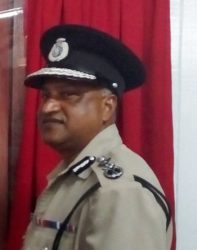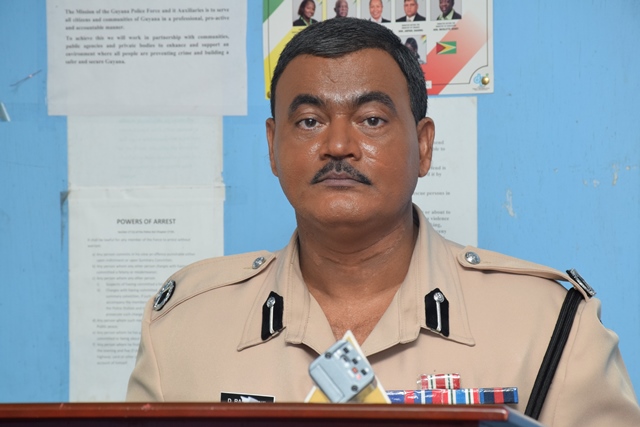By Clinton Conway
In Guyana police is a good word to start a conversation with, or even better to begin an argument. Over the past few years many persons have descended on the topic positing their views in the print and electronic media and elsewhere. There are numerous issues and concerns relating to the police. Their challenges are many.They defy any one – shot solution. Please permit me to join in the debate through this medium. However, constraint of space will only allow me to briefly express my views on certain aspects of training, strategic career development and succession planning. I hope that it will titillate others to join in the confabulation to make the police more professional and for them to deliver the highest quality of service to the citizens of Guyana they swore to serve and protect.
Efficiency and effectiveness in the performance of police duties require that all members be adequately trained to execute the task of law enforcement. Training therefore, serves the following broad purposes: To promote efficiency and effectiveness. To prepare members to act decisively and correctly in law enforcement situations and to foster cooperation and unity of purpose to sustain professional confidence with each member of the force and stakeholders at all times. In his address to the Police Officers’ Annual Conference 2017, His Excellence President Brig. David A Granger puts things succinctly, “I see you as professional officers, I don’t pick up a mason and make him a deputy commissioner. I don’t pick up a tassa drummer and say you must be superintendent. The answer is no. A professional force means first of all that you have to be educated, experience in your profession and your education separates you from the quacks …..A person who is not trained is a quack …. An if an officer is untrained and uneducated would you put your safety in his hands? The answer is no. So education especially in policing and training is the most important in your professionalism. …. Every aspect of policing requires training if it is to be done properly, an untrained officer is a dangerous person because you may be relying on him to do one thing and he does the wrong thing. “

Seelall Persaud
According to figures produced by the police, last year 3496 participants benefitted from 51 courses and 15 seminars conducted by the Felix Austin Police College while 660 were exposed to training conducted locally by overseas facilitators and 109 received training overseas. This is an extraordinary achievement but, how do the police know when training is required, the type of training to be executed and how they identify training needs? The ideal thing for the police to do is to conduct a Job Task Analysis country wide in order to identify training needs. It is expensive and time consuming, but if you fear expense try ignorance. In the interim the police can be guided by: Trends of internal investigations e.g Orderly Room and Boards of Inquiry; Evaluations coming out of Notified Inspections; Reports in the print and electronic media; Matters coming out of Annual Officers’ Conference, Senior Management meetings, recommendations from pertinent stakeholders; Matters coming out of Office of Professional Responsibility, Police Complaints Authority, Capita Symonds, Annual Confidential Reports, Strategic Planning Unit. Julian Lait, soon to be released Reform Report and as directed by the Commissioner of Police and others.
If you do not know where you are going any road will take you there. Here is the vexed question. How do the police know whether or not there are benefits to the individuals, their supervisors/ managers, the entire force and the country as a result of the training their ranks received? There must be a proper process of evaluation. The Kirkpatrick Model of training evaluation can be instructive. It has four levels : reaction, learning, behaviour and results. According to Wayne Bennett and Karen Hess (2002) the reaction focuses on the participants’ perception on the training.This is the most common type of evaluation.The learning level focuses on knowledge or skills acquired, ideally through post tests. The behaviour level looks as whether the knowledge or skills is actually applied on the job by observing the participants using what was learned. The results level focuses on the the department’s return on investment or cost benefit analysis, for example cost savings, increase in work output or quality. Bumgarner recommends, “ For criminal justice manager to know that the organisation has truly benefited from training of its employees, all four levels should be examined. “
I did not look into the crystal ball, but I wonder what the face of the police would look like in the next eight years. Assistant Commissioners David Ramnarine, Clifton Hicken, Paul Williams, Maxine Graham, Nigel Hoppie, Leslie James, Marlon Chapman, Linden Alves and several other very senior officers will reach the age of retirement unless their services are extended. There is talk about extending the retirement age to 60 years. This may not be a good thing for the force. Who will replace the retirees? This is where succession planning and strategic career development come into play. I do not know what the Strategic Planning Unit of the police force has in place. The Reform Project went into labour recently. We expect an excellent delivery. The plans of the two entities appear to be top secret. They are not yet for public consumption. A few years ago President Bharrat Jagdeo directed Commissioner of Police Henry Greene to identify 50 young and bright members of the force to be appointed cadet officers in order to strenghten the middle management of the force and for them and others to later become its leaders. My task as the Force Training Officer was to make the appointments a reality. During diverse times 46 men and women were appointed cadet officers after they had successfully completed the one year Standard Military Officers Course conducted by the Guyana Defence Force and subsequent training with the police. Since then not enough has been done in a structured way to develop these officers professionally and academically for the impending leadership positions they will hold. It has been more or less self development. Arnold (2000) posits, “Few police officers plan their careers. Most do not focus on promotional possibilities early enough, and have not prepared enough – either through formal education or assignment selection – to equip themselves for leadership roles. Strategic career planning can be a kind of road map to professional success. “
Three of the 46 officers are before the courts on criminal charges. One has been promoted to deputy superintendent, some are assistant superintendents, while others are still cadet officers. Perhaps, they can go into the Guinness Book of Records as the longest serving cadet officers. Many are in specialised areas for a number of years doing the same thing over and over again. At this stage of their career it would be better for them to generalise rather than specialise. There should be more job rotation and job enrichment. Being futuristic I believe that these officers and those who are likely to hold senior leadership positions must be simultaneously developed academically and professionally in order to face the leadership challenges ahead. It will require that they be exposed to more advanced police training both locally and overseas and training at the University of Guyana and other institutions of learning. University training must be a sine qua non. General Colin Powell in his book My American Journey calls the training the right of passage. Officers must successfully complete certain training before they are promoted to another rank. To do otherwise will invoke Dr. Peter’s Principle. Canadian Researcher, Dr. Lawrence J. Peter believes that persons will rise to their level of incompetence. We might very well end up promoting incompetence. Dr. Peter died some years ago but his principle may be very much alive today.
All is not lost. The police must now focus heavily on the middle managers but do not neglect the frontline supervisors who will replace them. I know the officers currently operating at the middle management of the force very well. I consider them fit and proper officers for future senior leadership in the force and elsewhere. I see them as individuals with great potentials for growth and development. What they require is job rotation, job enrichment, professional and academic training, mentoring and excellent leadership. The time is now ripe to do so. The future of the police is in good hands and on proper footing of various sizes. It is up to the movers and shakers of the GPF to make this a reality. The ball is in their court. Let them play it.
Clinton Conway is a retired Assistant Commissioner of Police










